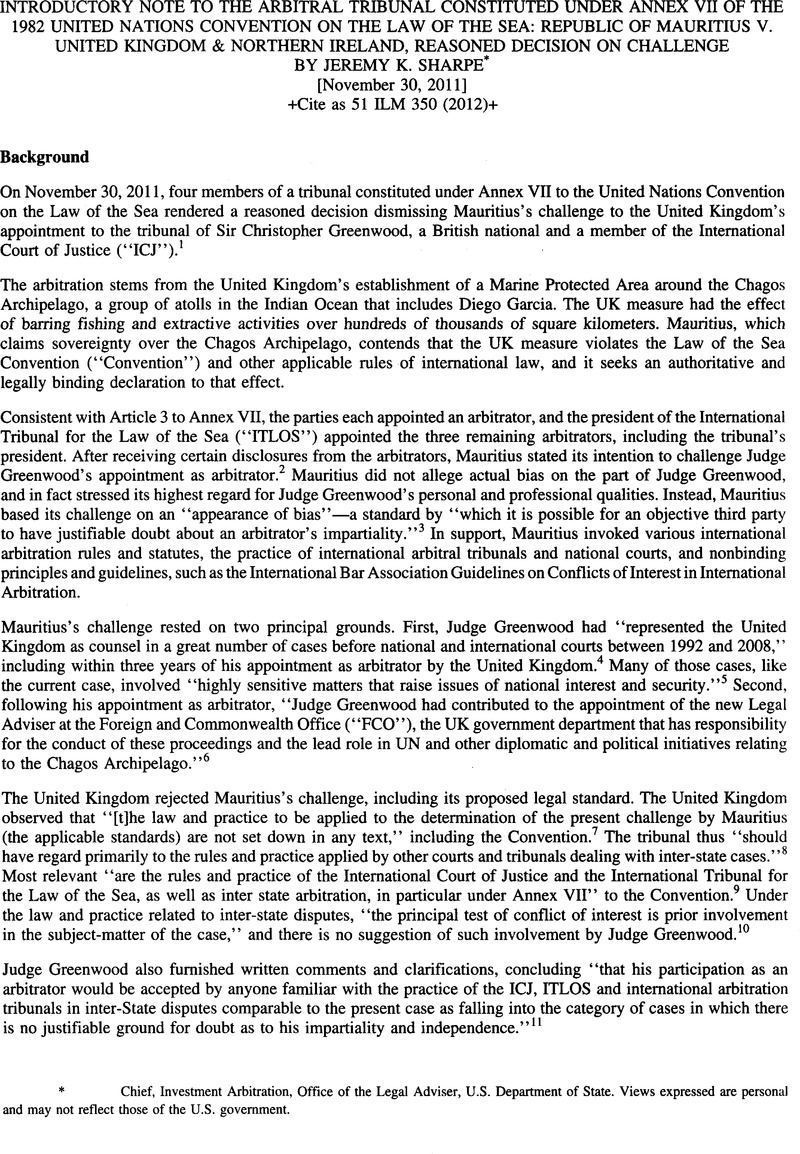No CrossRef data available.
Published online by Cambridge University Press: 27 February 2017

1 Reasoned Decision on Challenge, In the Matter of an Arbitration Before an Arbitral Tribunal Constituted Under Annex VII of the 1982 United Nations Convention on the Law of the Sea Between the Republic of Mauritius and the United Kingdom of Great Britain and Northern Ireland (Perm. Ct. Arb. Nov. 30, 2011), available at http://www.pca-cpa.org/upload/files/Reasoned%20Decision%20on%20Challenge.PDF [hereinafter Reasoned Decision on Challenge].
2 Although not mandated by the Convention or by Annex VII, it is the practice in arbitrations administered by the Permanent Court of Arbitration for arbitrators to declare that they are “impartial and independent with respect to each of the parties and intend to remain so,” and to disclose information that “might be of such a nature as to give rise to justifiable doubts as to [their] impartiality or independence.” Id. ¶ 136.
3 Id. ¶ 161.
4 Id. ¶ 162. Mauritius claimed that this breached the Orange List and Waivable Red List of the IBA Guidelines. Id. ¶ 75.
5 Id. ¶ 162.
6 Id. Mauritius claimed that this breached the Waivable Red List of the IBA Guidelines. Id. ¶ 76.
7 Id. ¶ 163.
8 Id.
9 Id.
10 Id. ¶ 53.
11 Id. ¶ 131.
12 Id. ¶ 165.
13 Id. ¶ 135.
14 Id. ¶ 166.
15 Id. ¶¶ 172-73.
16 Id. ¶ 182.
17 Statute of International Court of Justice art. 16(1), 59 Stat. 1055, T.S. No. 993 at 25,3 Bevans 1179 (providing that “[n]o member of the Court may ... engage in any other occupation of a professional nature.”). That provision, however, has not been interpreted as precluding members’ service on ad hoc commissions or tribunals.
18 Reasoned Decision on Challenge, supra note 1, ¶¶ 165, 167.
19 Id. ¶ 183 (finding “Judge Greenwood’s role to be consonant with the requirements pertaining to the activities of a judge of the ICJ,” and “[b]earing those requirements in mind” when evaluating the alleged conflicts).
20 Mauritius had argued that “the system of adjudication by a permanent court or tribunal, such as the ICJ or ITLOS, is fundamentally different from inter-State arbitration, including arbitral proceedings conducted pursuant to Annex VII, since in the former (i) the weight of the views of any particular judge is much more diluted given the higher number of judges, (ii) judges are elected, by contrast to an arbitrator unilaterally selected by a State as its party-appointed arbitrator, and (iii) most cases will not involve adjudication of a judge’s home or nominating State.” Id. ¶ 61.
21 Id. ¶ 112.
22 Id. ¶ 170.
23 Mauritius relied on statements of Professor George Bermann, Professor Kate Malleson, Judge Thomas Mensah, Professor Abimbola A. Olowofoyeku, Professor Yuval Shany, and Mr. O.L.O. de Witt Wijnen. The United Kingdom relied on statements by Dame Rosalyn Higgins and Judge Gilbert Guillaume.
24 Id. ¶ 184.